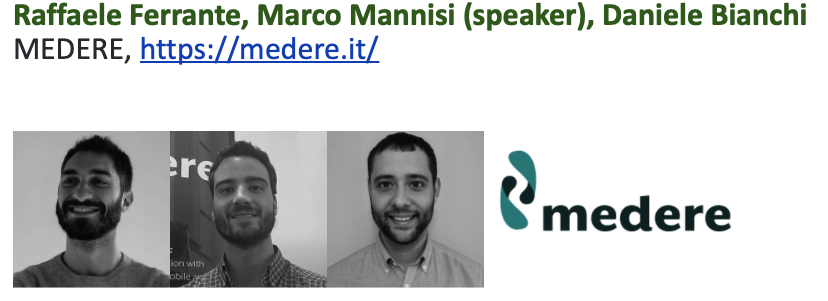Servizio Mailing List Tor Vergata
- From: MARROCCO Gaetano < >
- To: ,
- Cc: Federica Caselli < >, Sara Amendola < >, Raffaele Ferrante < >, Giuseppe Vairo < >, Alessandra Bianco < >, Paolo Bisegna < >, Elena Daprati < >, Pier Paolo Valentini < >, Luigi Bianchi < >, Myrka Zago < >, Michele Marino < >, Giancarlo Orengo < >, Occhiuzzi Cecilia < >, Di Lorenzo Nicola Nicola DiLorenzo < >, Massimo Bottini < >, Arianna Mencattini < >, Antonella Camaioni < >, Alessandra Cutri` < >, Almerinda Di Venere < >, Colantonio Paolo < >, Laura Menini < >, Corrado < >
- Subject: [ingmed-lm21-22] INGMED: Seminario su Start-Up
- Date: Mon, 11 Apr 2022 10:27:20 +0200
Buongiorno, Vi ricordo il doppio seminario di domani. Grazie e Saluti GM ==================== Buonasera, Il prossimo evento della nostra Rassegna di Incontri con la Ricerca e con l’Industria è molto particolare perchè ci farà capire come gli Ingegneri Medici possono cimentarsi anche con l’avventura dell’imprenditoria, nel mondo delle start-up. Avremo infatti ospiti nostri laureati che ora lavorano un piccole realtà ad altissimo contenuto creativo e tecnologico, costituendo un virtuoso canale di collegamento tra ricerca ed industria. Siete invitati a partecipare numerosi. Saluti GM Giovani imprenditori made in Tor Vergata Martedì 12 Aprile 2022 - ore 11:30 - Aula B1 Canale TEAMS: iy0r3x4  Sara Amendola, PhD, Co-founder and Executive Director https://www.linkedin.com/in/sara-amendola RADIO6ENSE Abstract - L’innovazione aperta (o Open Innovation) è un nuovo approccio strategico e culturale in base al quale le imprese, per creare valore ed essere maggiormente competitive, scelgono di ricorrere non più e non soltanto e risorse interne, ma anche a idee, soluzioni, strumenti e competenze tecnologiche che arrivano dall’esterno. Nell’era della transizione digitale, in cui prodotti, processi e modelli di business sono in rapidissima evoluzione, gli spin-off universitari svolgono un ruolo chiave nel favorire ed accelerare l’ingresso sul mercato di nuove tecnologie e sviluppare in poco tempo soluzioni tecnologiche ad altissimo valore aggiunto. Nel seminario vi racconterò come si colloca in questo contesto la storia di Radio6ense, spin-off di Tor Vergata (e in buona parte di Ing. Medica!), che dal 2013 sviluppa sistemi innovativi di sensoristica wireless per applicazioni sfidanti nel settore industriale manifatturiero, automobilistico, food e medicale  Raffaele Ferrante, Marco Mannisi (speaker), Daniele Bianchi MEDERE Coupling subject-specific musculoskeletal modelling, gait analysis and 3D printing for development of custom-made insoles: from academy to industry Abstract: Advances in musculoskeletal modelling allow accurate estimates of joints external and internal loads. Therefore, the development and application of subject-specific musculoskeletal models provide an opportunity to progress towards a better understanding and the personalised treatment of human biomechanics. During this seminar, we will provide examples on how subject-specific musculoskeletal model form gait analysis data can provide insights on how to create custom-made insoles for medial knee osteoarthritis. In addition, we will show how 3D printing can support the development of custom-made solutions and how this technology can help providing a fast, low-cost, and low waste alternative to standard techniques. Finally, we will discuss how applied research can became an industrial reality by showing the work of Medere, a start-up that developed and patented an innovative method to create custom-made insoles using digital acquisition, photogrammetry and 3D printing. Biography: Marco Mannisi has over 5 years of experience in applied health research field, especially in CAD design and 3D printing of custom-made orthotics for the management of osteoarthritis, and in finite element analysis and musculoskeletal modelling. He was an ESR in the EU-founded project Kneemo (European Union Marie Curie Actions- Initial Training Networks (ITN), FP7-PEOPLE-2013-ITN). Marco Mannisi graduated at the University of Rome Tor Vergata (Italy) in Medical Engineering (MSc) and got his PhD at Glasgow Caledonian University (UK) in Health and Life Sciences. He was a researcher at Rizzoli Orthopaedic Institute in the Laboratory of Medical Technology (Bologna, Italy) and visiting researcher at the University of Aalborg (Denmark), at the Paracelsus Medical Private University (Austria) and at the University of Melbourne (Australia). Marco has a track record of relevant scientific publications, and his work was presented to both scientific, in the most relevant conferences in the field, and during dissemination events. |
- [ingmed-lm21-22] INGMED: Seminario su Start-Up, MARROCCO Gaetano
- <Possible follow-ups>
- [ingmed-lm21-22] INGMED: Seminario su Start-Up, MARROCCO Gaetano
Archivio con motore MhonArc 2.6.16.